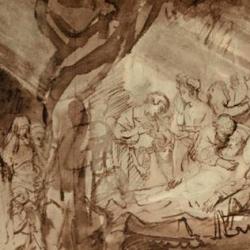?May he kiss me with the kisses of his mouth! For your love is better than wine.?ESo says the Bride at the beginning of the Song of Songs. And the chorus agrees: ?We will rejoice in you and be glad; we will extol your love more than wine.?E Later the bridegroom responds in kind: ?How beautiful is your love, my sister, my bride! How much better is your love than wine?Eand ?I have come into my garden, my sister, my bride! I have gathered myrrh along with my balsam, I have eaten my honeycomb and my honey; I have drunk my wine and my milk. Eat, friends, drink and imbibe deeply, O lovers.?E According to the bridegroom, his bride?s navel is like a ?round goblet, which never lacks mixed wine,?Eand her mouth is ?like the best wine.?E The bride longs to lead her lover into a house, where she ?would give her lover spiced wine to drink from the juice of her pomegranates.?E The Song of Songs is not the only place where Solomon compares love to wine. In Proverbs, he urges his son to ?rejoice in the wife of your youth?Eand to be ?intoxicated always with her love.?E
For the Bridegroom in the Song of Songs, the bride?s body is a vineyard, a garden, a field, a promised land flowing with milk and honey, where the Bridegroom can gather fruits for the intoxicating wine of love. ?A garden locked is my sister, my bride,?Esays the Bridegroom, ?a rock garden locked, a spring sealed up.?E She is a garden of pomegranates, of spices and aloes, a garden spring that runs with fresh water. In response, the bride unlocks the gate of her garden to her lover: ?May my beloved come into his garden and eat its choice fruits.?E Every Bridegroom who rejoices that he is one flesh with his bride is a new Adam; every bride who is a garden of delights for her husband is a new Eve; every godly and loving marriage, however marred by sin, is a re-establishment of Eden.
Yahweh too has a vineyard, and this vineyard is his bride. According to Isaiah, the Lord planted a vineyard on a fertile hill, ?dug around it, removed its stones, and planted it with the choicest vine.?E He ?built a tower in the middle of it, and hewed out a wine vat in it.?E He put a hedge around her, and built a wall for her protection. Yahweh established His bride, His vineyard, and expected to gather good fruit from her, to make wine that gladdens the heart of man and the heart of God.
Yahweh has a garden and a bride, a garden that is His bride; and Adam, His image, was given a bride and a garden, a bride that is his garden. These come together in Jesus, who is both Last Adam and Yahweh in flesh, who comes into the world as a bridegroom, a lover, and a caretaker of a vineyard. As the bridegroom, Jesus comes not only with the wine of love but with the wine of joy. When John the Baptist announces the coming of Jesus, he says, ?He who has the bride is the bridegroom; but the friend of the bridegroom, who stands and hears him, rejoices greatly because of the bridegroom?s voice. And so this joy of mine has been made full.?E
Even before Jesus is explicitly identified as the bridegroom in John?s gospel, He fulfills the role of bridegroom at the wedding of Cana, where He turned water to wine. It was customary in that day for the bridegroom to provide the wine for a wedding feast, so that by providing wine Jesus has taken over the responsibility of the bridegroom. Jesus?Erole as the bridegroom overarches the entire gospel of John and the book of Revelation. He is identified as the bridegroom at the beginning of the gospel, and the bride is revealed at the end of Revelation. At the beginning of John?s gospel, the Spirit descends from heaven to anoint Jesus; at the end of Revelation the bride descends from heaven to be joined to her husband. The entirety of John?s two-volume work is about the revelation of Jesus the bridegroom, and the coming of the bride.
Dotted throughout the romance that John writes are other references to the fullness of joy that the bridegroom brings. Jesus speaks of Himself as the vine, as the center of an Edenic garden, and He speaks as the true bridegroom, the Last Adam, instructing His disciples to keep His commandments so that they can abide in His love. He gives these instructions, He says, ?that My joy may be in you, and that your joy may be made full.?E Jesus encourages His disciples to ?ask and you will receive, that your joy may be made full.?E As Jesus goes to the Father, He tells the Father that He has spoken the Father?s words in the world, so that His own joy might be made full in His bride. Throughout John?s writings, Jesus is the bridegroom who provides the wine of joy.
Woelke, today you are taking Megan not only as your bride but also as your garden, your vineyard, and you are called to tend her, to beautify her, to set a wall of protection around her. Bring joy to your bride, as Jesus does to His, by your presence with her, by your words, by giving her what she needs and asks, by your comfort and encouragement in the midst of inevitable sorrows and challenges. Be intoxicated always with her love. Megan, today you admit this man and this man alone into your garden. May you find his love better than wine, and may you be filled with the wine of joy. You are called to bear fruit for the joy and delight of your husband ?Ethe fruit of beauty, of order, of grace, of peace, of comfort ?Ethe fruit, under the Lord?s blessing, of children.
One of the most striking things that Jesus does as bridegroom is to save the better wine for later. At the wedding in Cana, the headwaiter is astonished at this departure from custom, and the astonishment for ancient readers would have gone much deeper. Ancient man was convinced that the later was always worse, the supplement always a degeneration from the origin. But Jesus reversed that. Where ancient man believed that the golden age was past, perhaps never to be recovered, Jesus proclaimed the future coming of God?s kingdom. Where ancient man believed that a woman was a defective man, Scripture teaches that the woman, who comes second, is the glory of the man. Where ancient man served the best wine first, Jesus serves the better at the end of the feast. This later wine is the fullness of love and the fullness of joy.
This is wonderfully captured in one of the most beautiful passages in Alexander Schmemann?s beautiful book, For the Life of the World : ?In movies and magazines,?Ehe writes, ?the ?icon?Eof marriage is always a youthful couple. But once, in the light and warmth of an autumn afternoon, I saw on the bench of a public square, in a poor Parisian suburb, an old and poor couple. They were sitting hand in hand, in silence, enjoying the pale light, the last warmth of the season. In silence: all words had been said, all passion exhausted, all storms at peace. The whole life was behind ?Eyet all of it was now present, in this silence, in this light, in this warmth, in this silent unity of hands. Present ?Eand ready for eternity, ripe for joy. This to me remains the vision of marriage, of its heavenly beauty.?E Of course, there is a vision of heavenly beauty also in the passions of youth. But, Woelke and Megan, don?t forget that the better wine comes later. As joyful as you are today, as joyful as your family and friends are today, this is, by comparison with what is to come, only the water of your marriage. By the power of the Bridegroom, it will be transfigured to into wine, into fine, aged wine.
But ?Eand this is absolutely essential ?Eyou cannot expect to enjoy the wine of love or the wine of joy unless you have also received another intoxicant, the Spirit of Jesus. And the Spirit?s effect is like the effect of wine: When the Jews saw how the apostles were acting at Pentecost they believed that they were drunk with new wine, and Paul exhorted the Ephesians not to be drunk with wine but to be filled ?E?inebriated,?ESt. Ambrose said ?Ewith the Spirit. Pentecost is less than two weeks away, and let that be a marker for your marriage ?Epray that your entire marriage will be
carried out under the rubric of Pentecost. Walking in the Spirit will bring a harvest of love and joy, and nothing else will.
And so, Woelke and Megan: Cling to one another, but cling also to the Divine Bridegroom. Drink deeply of one another, but even more drink deep of the Spirit. Be intoxicated in joyful love and loving joy, but above all be inebriated by the Spirit. For these three bear witness of heavenly life: the Spirit, and the love, and the joy. And these three are one.
Let us pray.















